Bangladeshi nationals arrested and deported from India for illegal immigration tell mid-day why and how they cross through the porous borders
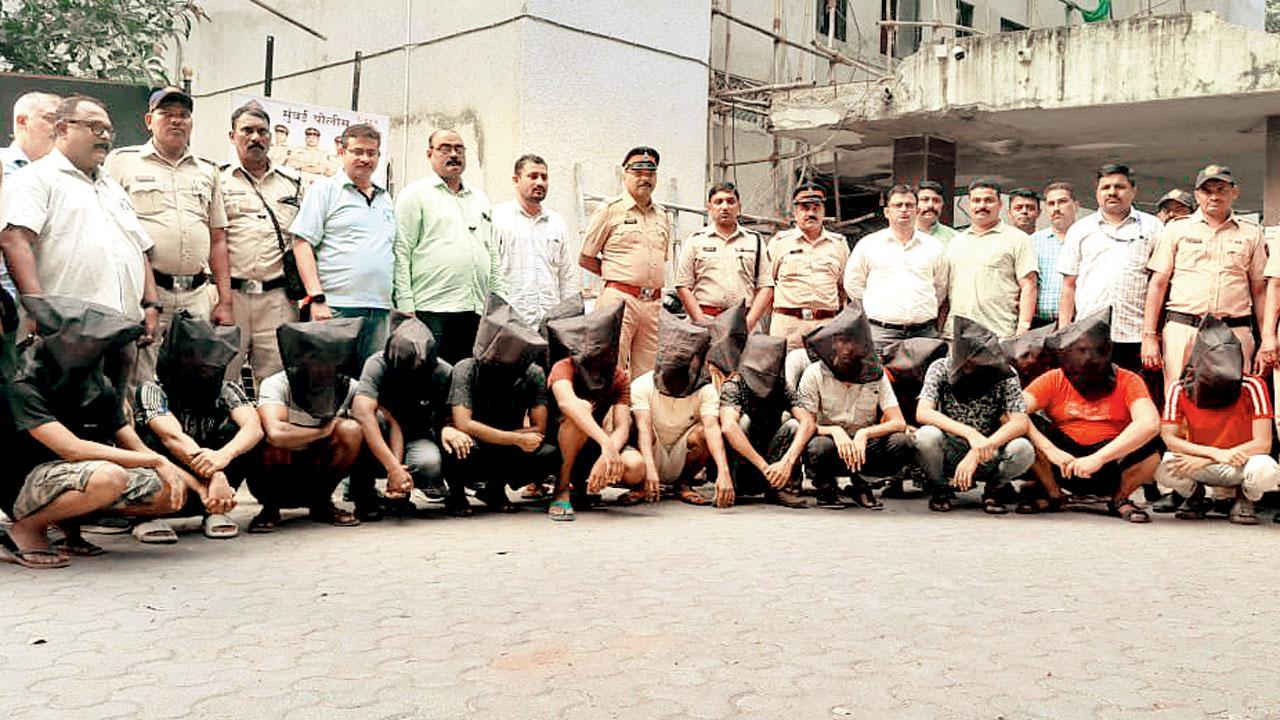
Borivali police with 17 illegal Bangladeshi immigrants arrested in October
Safdar Ghazi (name changed) is 32 years old. He stays with his family in the Kalia district and earns a living on a day to day basis, taking whatever work he can. But even today, he wishes he were in India, where opportunities were better and earnings were higher.
“Living in Bangladesh wasn’t helping me take care of my wife and two children,” he tells mid-day, speaking from Bangladesh. “In India, I could have earned at least Rs 400 to Rs 500 at construction sites, which was a huge step up from my life here.”
The fact that he regards the measly amount as a “step-up” is an indicator of just how desperate things are, and gives us an insight into the ever-growing issue of illegal Bangladeshi immigrants coming to India.
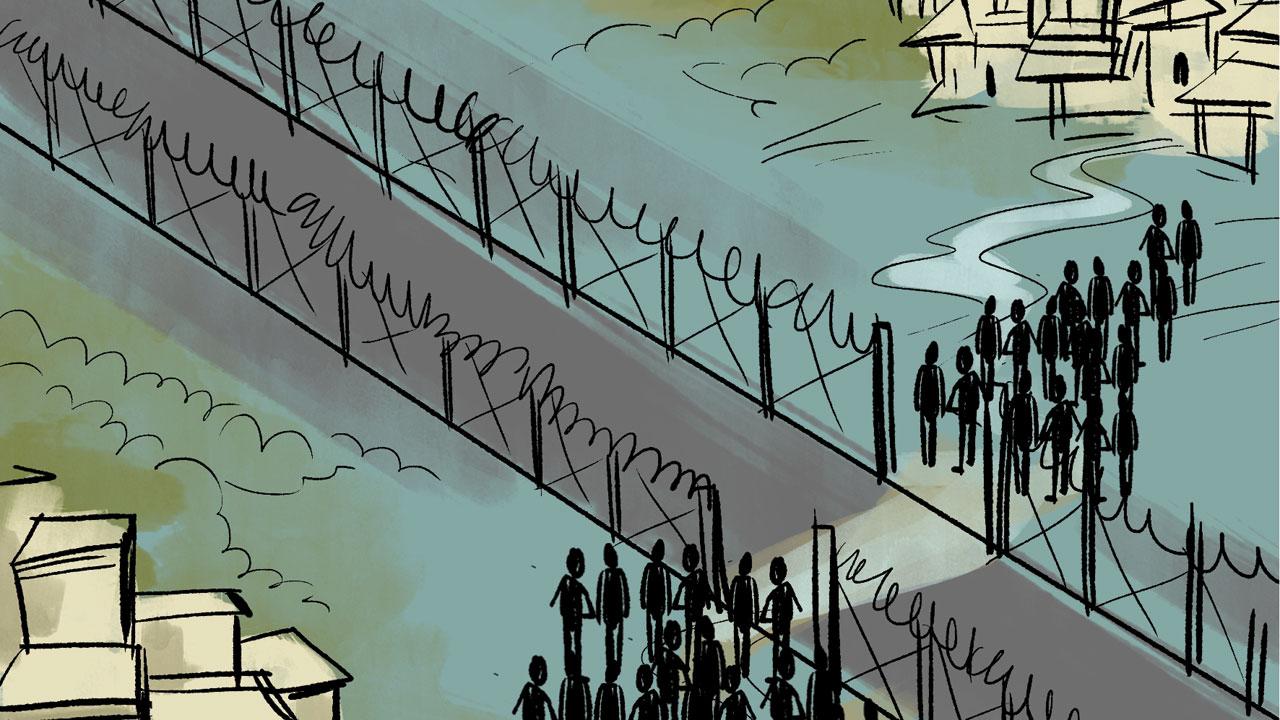
Agents on both sides of the Indo-Bangladesh border facilitate the entry of Bangaldeshi nationals, looking for better-paying job opportunities, into India
In September this year, Salman Fazlur Rehman, advisor to Bangladesh Prime Minister Shekh Hasina, was quoted as saying that illegal Bangladeshi immigrants were ‘economic refugees’, who would return to their country once the economic situation improves back home. Safdar’s words are testimony to just how bad it is in his country.
It wasn’t easy to get hold of Safdar. We had to go through a middleman and establishing contact took time. Even after that, details flowed reluctantly from the now deported immigrant, who tried crossing into India in vain around three years ago.
“I managed to make contact with some agents, who asked for Rs 12,000 in exchange for helping me get into India. They told me they could help me get jobs in metro cities and asked for an additional Rs 10,000 if I wanted accommodation sorted out. I paid them the entire amount, but while crossing into India through Hakimpur, I was detained by security forces on the Indian side. I spent a few days in their custody before being deported back home,” says Safdar.
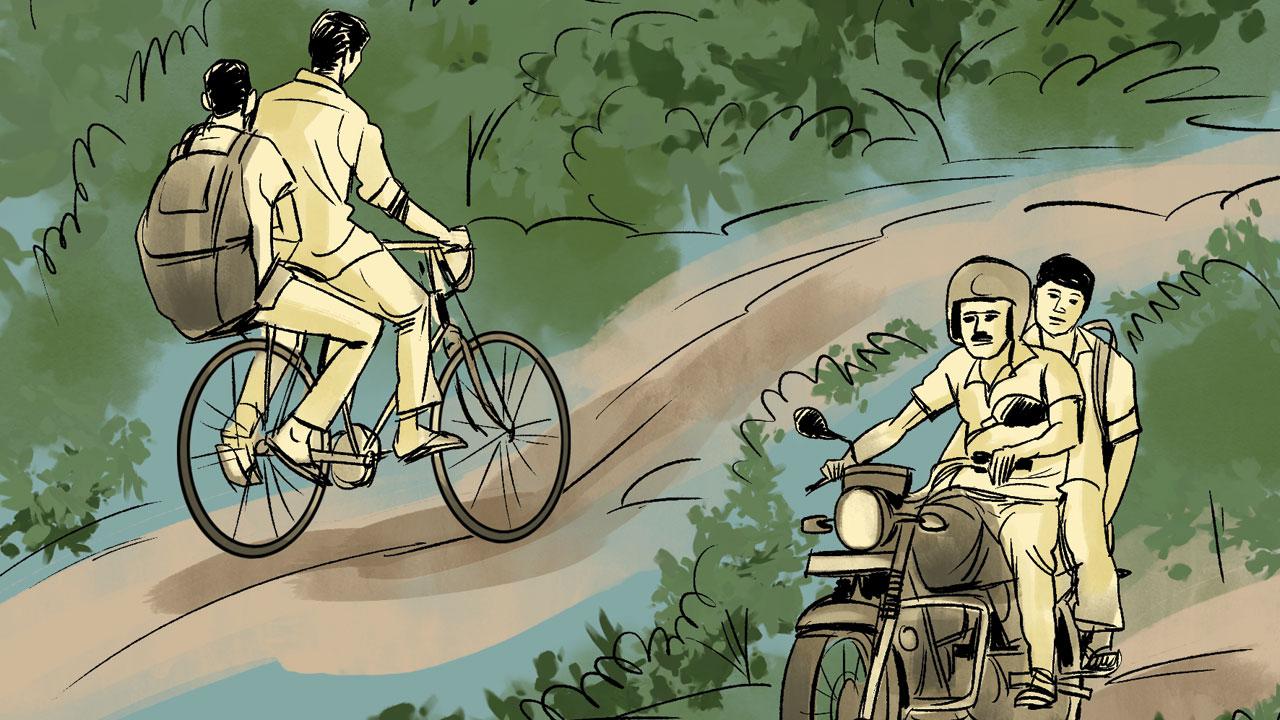
In rural areas, far from urban centers, agents guide individuals to illegally cross the border on both sides, navigating through farms on motorbikes and bicycles
He is most unwilling to explain exactly how people like him cross into India. This is something we observe throughout our research; all of them simply refer to it as “crossing the border”; no one wants to go into specifics unless prodded repeatedly.
“It all depends on the agents,” Safdar finally says. “Sometimes, one batch crosses over along with people who are legally crossing the border. Nobody knows how, but these illegal immigrants simply breeze through without being stopped or subjected to proper checking. Some say because the agents make coded markings on the documents of the immigrants; signals for security officials that they are supposed to turn a blind eye towards this lot.” Is it that easy, we wonder. It’s even easier sometimes, apparently.
“Some of us come through hiding in trade trucks that shuttle between India and Bangladesh,” says Shumail Kazi (name changed), another native of Kalia district. “Yet others cross through gaps in the fences in the dead of the night.” Shumail lived in Mumbai for a year before being arrested and deported. The 40-year-old says he paid Rs 15,000 to the agents in Bangladesh, who helped him cross through Benapole in Bangladesh.
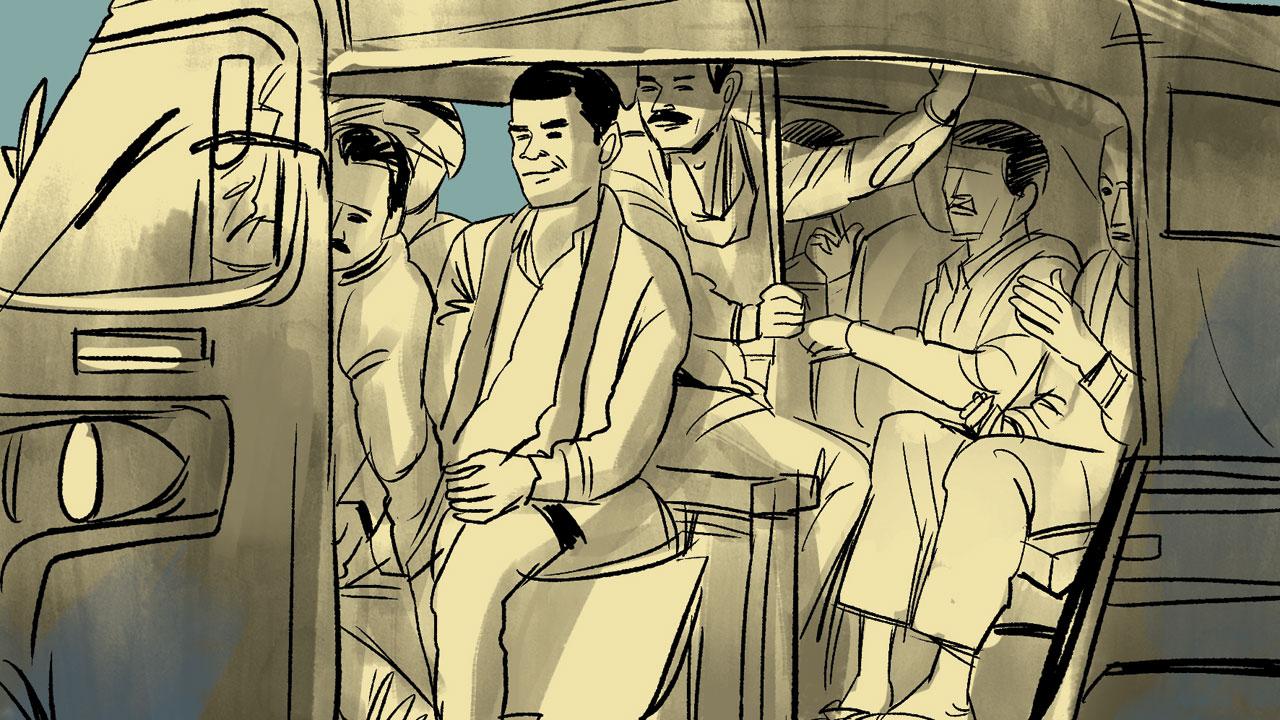
Once across the border, agents ensure the safety of their clients by dropping them off at secure locations, with the assistance of auto-rickshaws or private vehicles
“From there, I made my way to Howrah in West Bengal, where an Indian agent was waiting for me. He handed me a ticket to Mumbai and warned me that I should only travel in the general compartment, which is more crowded than others and hence, easier to stay hidden in. I was wracked with anxiety throughout the journey but got into Mumbai safe and sound,” he recalls. One would believe that it would be especially difficult for an illegal immigrant to get life started in a strange city. Again, we’re wrong.
“I was already provided with a bogus Indian Voter ID card before I even crossed into India. Once in Mumbai, I was also provided Aadhar and PAN cards. All I had to do was pay R10,000 and two passport size photographs of me. From there on, everything, including accommodation and jobs,” says Shumail. Ashraful Sheikh (name changed), who crossed over in 2018 and stayed in Mumbai for two years before being arrested and deported, confirms this.
“Me and the others I crossed with stayed in a small house after we crossed through Hakimpur, till our bogus Indian documents were prepared and handed over to us. Then, I came to Mumbai and made my way to Wadala, where I earned at least Rs 500 every day as a construction worker,” he says. Ashraful has one more disturbing titbit for us to chew on.
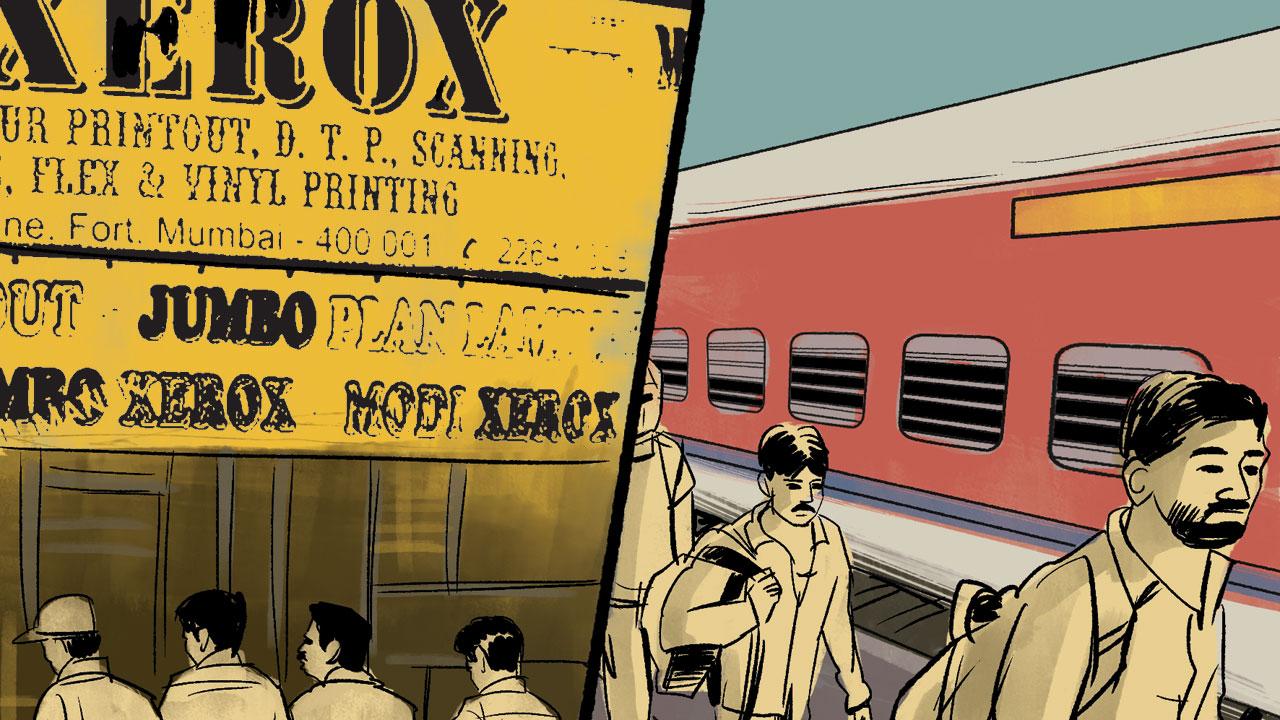
Forged ID documents like Voter IDs are provided to the illegal immigrants, which they use to book tickets to metro cities like Mumbai and Delhi. Illustration by Uday Mohite
“The agents gave a very well-oiled network. I know of people who shuttle between India and Bangladesh regularly, and have never been caught. A lot of them hide at farms near the borders, because farmers cross the borders by mistake frequently. If caught, they can simply claim they lost their way. If not, they can sail through,” he says. Sceptical, we set about verifying this information, hoping it will be pooh-poohed at some level. It wasn’t.
mid-day spoke to several police officers in Mumbai, including those with the Borivali police station, which recently arrested 17 illegal Bangladeshi immigrants from its jurisdiction in October. “Our investigations reveal that there are agents in the 24 Parganas district who are waiting for the illegal immigrants with forged Voter ID cards, already prepared in their names. These are used as ID cards to book train tickets from West Bengal to other cities in India. After this point, the immigrants cut off all contact with the agents, and the link is severed,” says an officer.
Another confirms that the agents have a wide network of inroads into the country, including farmlands and secluded, unsecured patches in the border fences. According to official data obtained from the Mumbai Police, a total of 449 Bangladeshi nationals have been arrested in the last two years, after they were found to be staying here illegally. This year alone, the number stands at 310 immigrants.
“We are actively monitoring illegal immigrants and conducting special drives to apprehend them, so that they can be charged under the Foreigners Act. Our teams are closely monitoring specific areas in the city, where the most number of illegal immigrants were found earlier. Several agents and shopkeepers involved in the creation of forged documents have also been apprehended,” says Joint Commissioner of Police (Law and Order) Satyanarayan Choudhary, Mumbai Police.
The issue of illegal Bangladeshi immigrants, however, extends far beyond just the violation of the Foreigners Act. The Maharashtra Anti Terrorism Squad has also been keeping tabs on them, because several of them arrested in the past have been found to be linked to Ansarullah Bangla Team (ABT), a radical Islamic organisation based in Bangladesh which has been banned and declared a terrorist organisation in India.
Despite the unceasing efforts of Indian authorities, the unauthorised entry of Bangladeshi nationals also appears to be relentless, attributed in part to the extensive Indo-Bangla border spanning 4,096.7 km, with states like West Bengal, Mizoram, Assam, Meghalaya and Tripura, as per government records.
“Certain areas along the border lack fencing and remain fully open. Illegal crossings predominantly occur in these regions, where individuals engaged in farming or cattle-rearing inadvertently cross the border without detection by authorities, sometimes facilitated by bribery,” an informant assisting the Mumbai police in apprehending illegal Bangladeshi immigrants tells mid-day.
“Numerous places allow easy border crossing, but some major points that I know of include Hakimpur, Hili, Balti, Ghojadang India Check post, Keraniganj Upazila, and Benapole, which serve as entry points for Bangladeshi nationals into India,” the informant adds.
Balakrishna Kamath, a retired Intelligence Bureau officer and author of books such as The Velvet Gloves” and The Ace of Shadows, says that when Bangladesh was liberated from Pakistan and was formed as an independent state, its people severe economic hardships and persecution. Due to the open border, many chose to return to India, as there was minimal fencing at the time.
“They chose India because of the homely feeling, sharing the same culture, and finding familiarity in West Bengal due to the language. Additionally, the presence of a large Muslim population in India added to the sense of homeliness as well as a setting to live unnoticed. Their migration was solely due to the adverse conditions in Bangladesh, devoid of any political motivations,” Kamath explains.
Indeed, the reason why the demand for a separate state of Bangladesh arose in East Pakistan was because the then Pakistan government announced its intention to declare Urdu as the country’s national language in 1970, creating an instant feeling of alienation among East Pakistan’s predominantly Bangla-speaking population.
Kamath, who has extensively studied the topic, delves into the political dimension of immigration, citing the Assam Movement from 1979 to 1985. Also known as the Anti-Foreigners Agitation, the movement aimed at deporting illegal immigrants, alleging exclusion of numerous names from the electoral roll. Led by the All Assam Students Union, the movement witnessed ethnic violence in Assam and neighbouring states until its resolution in 1985.
Kamath points out that the political movement in Assam had wider ramifications for the Bangladeshi migrants in most border states including West Bengal. This prompted Bangladeshi immigrants to shift to other parts of the country, such as Bihar, Kerala, and Maharashtra as they felt going to Assam and other border state would be dangerous.
Notably, these migrants began adopting the local languages in their new regions and offering to work at lower remuneration, which was nearly half of the prevailing rate for the Indian labourers. Taking advantage of the huge difference in labour charges, the local contractors started entertaining more Bangladeshi migrants. Consequently, the mass migration, initially confined to the border states, expanded to other regions affecting the local social and political dynamics.
He adds that under Prime Minister Shaikh Hasina, economic growth in Bangladesh came close to India’s growth rate last year. This has helped generate employment opportunities and consequently, there is a decreasing trend in migration, legal or illegal. However, it still persists, driven by attractive employment opportunities in India at lower wages compared to Indian labourers.
“When the culture and the language are similar and economic factors are strong, it becomes very difficult even if you put fences, and this is happening everywhere, even in Europe. The solution, I would say, would be for Bangladesh to focus on its own progress. India should work with them to stabilise the situation, because any kind of anarchy and breakdown over there is going to affect India the most,” says Kamath.
He adds, “We may need to take mutually beneficial measures to facilitate and boost the trade between Bangladesh and Nepal trade, such as constructing rail corridors and electricity transmission lines. Overall, contributing to Bangladesh’s stability is important to address the issue of illegal migration. Even if we put up fences or walls, they will still find ways to enter India illegally. There is always a reason for migration, be it political, social, or economic.”
 Subscribe today by clicking the link and stay updated with the latest news!" Click here!
Subscribe today by clicking the link and stay updated with the latest news!" Click here!








